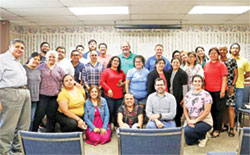Hispanic Ministry / Felix Navarrete
Social justice emanates from the heart of Jesus Christ
(En Espanol)

More than 30 parish leaders took part on Aug. 11-12 in a collaborative training effort provided by the Indiana Catholic Conference and an interdiocesan alliance to discuss several topics, including some of the challenges faced by undocumented immigrants. (Submitted photo)
In a society with so many challenges and diversity of interests, we find a palpable reality that strongly demands our attention, especially in the Christian sphere where one of our biggest interests continues to be man and his dignity as a human being and as a child of God.
The topic of social justice should not be considered revolutionary by a group that seeks to claim its importance, nor is it a new anthropological philosophy where man becomes the center of everything. On the contrary, the topic springs from the heart of our Lord Jesus and is intrinsically a part of the Gospel message to love and care for the most vulnerable and needy.
In reality, our Lord never tried to abolish the law of the ancients, but gave it a more human meaning by creating a close relationship between man and God. What Jesus called the law of love, we can consider as the first foundation for the social doctrine of the Church: “For God so loved the world that he gave his only Son, so that everyone who believes in him might not perish but might have eternal life” (Jn 3:16).
This reality reflects the true evangelical meaning of the message of a triune God, incarnated in a human being who experienced firsthand the challenges of society and the injustices of the world. It is a truth that led Jesus to be unjustly accused for simply wanting to demonstrate a particular and real interest in those who were oppressed by an authoritarian regime.
Social justice invites us to continue with our evangelical mission, but above all, it invites us to imitate the first teacher in social doctrine: Jesus.
There are many challenges that we as a Church must respond to, including the endless realities of injustice experienced by diverse peoples or groups in the world.
But it is important to remember that the Church is especially characterized by our being “Catholic,” that is, universal. Such universality has unimaginable power when there is unity among the people of God, when the interest of a few acquires the strength of many, and even more so when we invoke the help that we get from the Holy Spirit.
The last act of love by our Lord Jesus before his resurrection was to give his blood completely, that is, to empty himself, of every last drop of blood and water. His blood reminds us of his pain, and the water washes that pain and gives us hope.
The scene of Jesus being pierced in the side leads us to reflect on a people who groan and cry for mercy, a people who suffer injustice and lack of love, a tragic scene where very few feel the shame of seeing a young man hanging from a cross without having deserved it. It is a scene that describes the deep pain of women when they see such an outrageous act that attacks the human gaze.
When we relive that scene, we think of the mothers who suffer from not being able to save or protect their children from war or malnutrition, or from not being able to have the opportunity to provide basic rights to their little ones, including living in a healthy environment or being able to send them to school. In this scene, I also see the lack of mercy for some who passed by without showing compassion in the face of such injustice.
Our Church suffers and cries alongside these mothers who have no voice, suffering and crying with the marginalized of society. Our Church presents the pain of a crucified Christ, not as a sign of defeat as some believe, but as a sign of humanity to remind us that, as a Church, we have been the product of great pain.
The Church of Christ also cries out for justice for the helpless, accompanies them in suffering and represents a light for many. It is a home and shelter for immigrants and a refuge for those who desperately seek comfort.
Our archdiocese is part of a group of organizations that is advocating for changes that generate better conditions for our most vulnerable.
Currently, with the support of the Indiana Catholic Conference and an interdiocesan alliance, we are joining forces so that our undocumented immigrants might be able to obtain a permit to drive. At present, it appears somewhat complicated since laws have not yet been designed to benefit some people. Laws are written to guarantee a social order, but we also know that the world is moving and undergoing changes that should lead us to consider possible ways to provide solutions to new realities. A first step of this initiative was a training session for parish leaders that involved more than 30 people, including two of our state senators.
Identifying the signs of the times can lead us down a path that started more than 2,000 years ago, a path that began with a change, generating a transformation in a group of 12 people, who lived and understood the messianic message and whose contribution to our society kept us alive as a Church with the hope that one day all will understand our Lord’s message of loving and serving all our brothers and sisters.
It is a message that springs from the Sacred Heart of Jesus and promises hope and comfort for those who are tired and overwhelmed, a heart that becomes a place of rest for many, and one that strengthens us in our mission.
(Felix Navarrete is archdiocesan coordinator of Hispanic Ministry.) †
